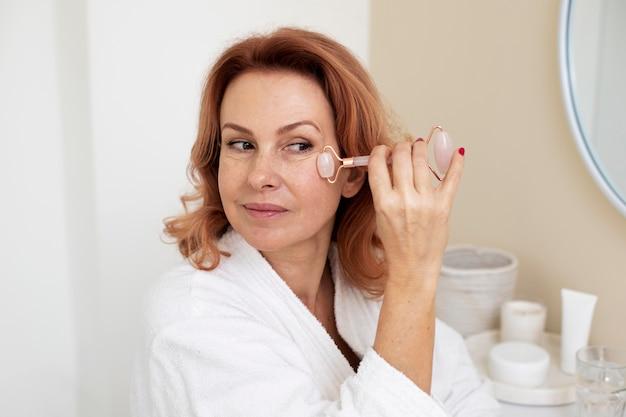As we age, our skin naturally undergoes various changes that demand a modified approach to care and treatment. The main question of what is not beneficial for mature skin merits a thorough understanding, as it can pave the way for maintaining a healthy, radiant complexion in the later years of life. This article will delve into several common treatment methods and ingredients that are often misconstrued as beneficial but can, in fact, lead to adverse effects on mature skin. The goal is to highlight the importance of gentle, nurturing practices that align with the unique needs of aging skin.
Navigating the Sea of Skin Care: What Not to Do

It’s a minefield out there in the world of skin care, especially when it comes to treating mature skin. To navigate these tricky waters, it’s crucial to identify treatments and products that may do more harm than good. Mature skin is delicate and requires a nuanced approach—what worked in one’s youth can, unfortunately, become detrimental in later years. Below, we will explore some widely adopted skin care steps that should be approached with caution or avoided altogether.
Harsh Exfoliants: A Rough Approach to Avoid
Mature skin often loses the capacity to regenerate as quickly as younger skin, which might tempt one to use harsh exfoliants to aid the process. However, strong physical or chemical exfoliants can strip away essential layers, compromising the skin’s natural barrier. This leads to increased sensitivity and susceptibility to environmental damage.
Instead of reaching for rough scrubs or high-concentration acids, consider gentle exfoliants like lactic acid or enzymatic peels that resurface the skin without aggressive action. A non-abrasive exfoliation routine allows for cell turnover without exposing the skin to unnecessary harm.
High-Intensity Treatments: Proceed with Caution

While it’s tempting to seek immediate results through high-intensity treatments such as deep chemical peels or ablative laser therapies, these procedures pose significant risks for mature skin, including prolonged redness, scarring, and even infections. The skin’s healing capabilities diminish with age, and thus, recovery from these aggressive treatments can be both challenging and uncomfortable.
A safer alternative for enhancing the appearance of mature skin might be microdermabrasion, non-ablative laser treatments, or gentle chemical peels, which offer subtle improvements over time, minimizing the potential for adverse effects.
Alcohol-Based Products: A Drying Dilemma for Mature Skin
Often found in toners and cleansers, alcohol-based products can feel refreshing, but they are a poor choice for mature skin. The immediate effect of tightness and degreasing might give the illusion of cleanliness; however, in reality, these products are stripping away vital moisture and disrupting the skin’s lipid barrier.
To maintain hydration, it’s best to opt for alcohol-free formulas enriched with hydrating ingredients like hyaluronic acid, glycerin, or aloe vera, which help to preserve and boost the skin’s natural moisture levels.
One Size Fits All? The Myth of Universal Skin Care Solutions
As every individual’s skin is unique, especially as it matures, it is critical to acknowledge that there’s no magic bullet product suitable for everyone. Mature skin, with its distinct concerns like wrinkles, hyperpigmentation, and loss of elasticity, requires a personalized skin care regimen that addresses these specific conditions.
The following list presents two key considerations when tailoring your mature skin care regimen:
- Evaluate your skin type and existing concerns to select products that are designed to nurture and protect mature skin without causing irritation.
- Consult with a dermatologist or skin care professional who can give expert advice on product types and ingredients catered specifically to your skin’s needs.
Inadequate Sun Protection: The Oft-Forgotten Essential
One of the most underestimated elements in mature skin care is robust sun protection. Ultraviolet rays can exacerbate the signs of aging and increase the likelihood of disease. However, a simple, diligent application of broad-spectrum sunscreen every day can serve as your first line of defense.
Besides sunscreen, there are other protective measures that should become a non-negotiable part of your daily routine:
- Wearing protective clothing like hats and long sleeves.
- Seeking shade during peak sun exposure hours.
Overlooking Skin Nutrition: The Inside-Out Approach to Avoid
Many of us neglect the profound impact our diet can have on the condition of our skin. Mature skin, which is more prone to drying out and showing signs of aging like fine lines and dullness, particularly benefits from a nutrient-rich diet. A comprehensive approach to skin care should extend beyond topical treatments and acknowledge the nourishment provided by healthy foods and supplements.
| Nutrient | Benefits for Mature Skin | Food Sources |
|---|---|---|
| Vitamin C | Boosts collagen production and fights free radicals. | Citrus fruits, bell peppers, strawberries |
| Vitamin E | Provides antioxidant protection and supports skin healing. | Almonds, spinach, sunflower seeds |
| Omega-3 fatty acids | Strengthens skin barrier and reduces inflammation. | Salmon, chia seeds, walnuts |
Conclusion
The journey to maintaining healthy, beautiful mature skin is fraught with potential missteps. By avoiding harsh exfoliants, alcohol-based products, high-intensity procedures, and overlooking essential sun protection and nutrition, you can safeguard your skin against common pitfalls. Embracing a regimen that’s tailored specifically to your skin’s evolving needs can help preserve its integrity and ensure that it remains vibrant and resilient throughout the years.
FAQs: Navigating the Complex World of Mature Skin Care
Even with a better understanding of what treatments to avoid, navigating mature skin care can still raise numerous questions. Here are some answers to common queries:
- Q1: Why should I avoid strong exfoliants on mature skin?
- A1: Strong exfoliants can over-strip the skin, causing damage and vulnerability to environmental stressors. Gentle alternatives are better at preserving skin health.
- Q2: Can high-intensity skin treatments be harmful to aging skin?
- A2: Yes, due to the diminished healing capabilities of mature skin, these treatments can be too aggressive, causing long-term damage and discomfort.
- Q3: Why is alcohol-based skincare bad for mature skin?
- A3: Such products dehydrate the skin and disturb the lipid barrier, leading to increased dryness and irritability. It’s wiser to choose products that hydrate and protect.
- Q4: How does poor nutrition affect mature skin?
- A4: Nutrient deficiencies can result in loss of elasticity, increased wrinkles, and a lackluster complexion, compromising the overall health of the skin.
- Q5: Is sunscreen really necessary for mature skin every day?
- A5: Absolutely. Consistent use of sunscreen helps protect against UV damage, preventing accelerated aging and lowering the risk of skin cancer.
